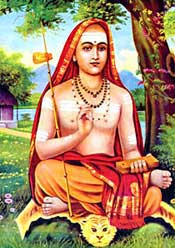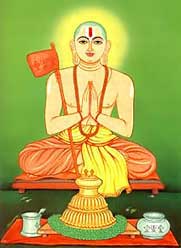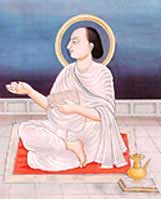Bhakti Movement
In the ninth century Sankara started a Hindu revivalist movement giving a new orientation to Hinduism. He was born in Kaladi in Kerala. His doctrine of Advaita or Monism was too abstract to appeal to the common man. Moreover, there was a reaction against the Advaita concept of Nirgunabrahman
 |
| Sankara |
(God without attributes) with the emergence of the idea of Sagunabrahman (God with attributes).
 |
| Ramanuja |
In the twelfth century, Ramanuja, who was born at Sriperumbudur near modern Chennai, preached Visishtadvaita. According to him God is Sagunabrahman. The creative process and all the objects in creation are real but not illusory as was held by Sankaracharya. Therefore, God, soul, matter are real. But God is inner substance and the rest are his attributes. He also advocated prabattimarga or path of self-surrender to God. He invited the downtrodden to Vaishnavism.
 |
| Vallabhacharya |
In the thirteenth century, Madhava from Kannada region propagated Dvaita or dualism of Jivatma and Paramatma. According to his philosophy, the world is not an illusion but a reality. God, soul, matter are unique in nature. Nimbarka and Vallabhacharya were also other preachers of Vaishnavite Bhakti in the Telungana region. Surdas was the disciple of Vallabhacharya and he popularized Krishna cult in north India. Mirabai was a great devotee of Krishna and she became popular in Rajasthan for her bhajans. Tulsidas was a worshipper of Rama and composed the famous Ramcharitmanas, the Hindi version of Ramayana.




